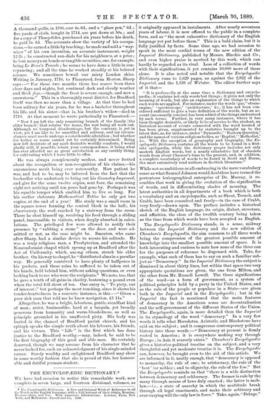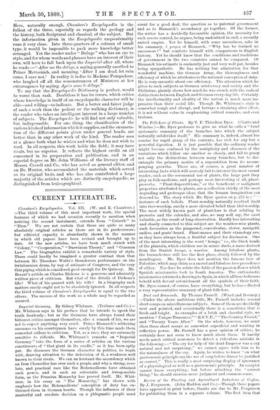THE ENCYCLOPEDIC DICTIONARY.*
WE have had occasion to notice this remarkable work, now complete in seven large, and fourteen divisional, volumes, as • The Encyelopredie Dictionary. A New and Original Work of Reference to all the Words in the English Language, with a Full Account of their Origin, Meaning, Pronunc'ation, and Use. With numerous Illustrations. London, Paris, New York, and Melbourne : Cassell and Co. 1889.
it originally appeared in instalments. After nearly seventeen years of labour, it is now offered to the public in a complete form, and as " the most exhaustive dictionary of the English language yet put before them." This is a bold claim, but it is
fully justified by facts. Some time ago, we had occasion to speak in the most cordial terms of the new edition of the Imperial Dictionary, published by Messrs. Blackie and Co, and even higher praise is merited by this work, which can hardly be regarded as its rival. Less of a collection of words
with their significations, it yet contains 50,000 more of these alone. It is also noted and notable that the Encyclopmclic Dictionary runs to 5,629 pages, as against the 2,922 of the Imperial, and the 1,538 of Webster. The editor further says of it that-
" It is professedly at the same time a dictionary and encyclo- pmdia ; it explains not only words but things ; it gives not only the meaning of words, but also an explanation of the things to which such words are applied. For instance, under the words `gas,' `steam- engine,' architecture,' &c., it has not been con- sidered sufficient to give a bare definition of the words, but an ac- count (necessarily concise) has been added of the things understood by such terms. Further, in very many instances, where it has been thought desirable, or likely to be of service to the student, an historical account of events connected with the word treated of has been given, supplemented by statistics brought up to the latest date, as, for instance, under Dynamite," Eastern Question,' and the names of various religious bodies, as `Baptist,' `Methodist,' &c. With the exception of geography and biography, the En- cyclopcedic Dictionary contains all the words to be found in a &st- rata cycloptedia, while the dictionary proper includes not only modern English words, but a nearly exhaustive list of obsolete words from about Chaucer's time to the present, and, in addition, a complete vocabulary of words to be found in Scott and Burns, the most extensively read authors in Scottish literature."
While not so ambitious or all-embracing in the mere vocabulary sense as what Samuel Johnson would doubtless have termed the portentous lexicographical enterprise of Dr. Murray, it re- sembles that work in giving the evolution of the signification of words, and in differentiating shades of meaning. The latest authorities in all departments of a book which is both a vocabulary and an encyclopaedia, such as Skeat, Trench, and Crabb, have been consulted and freely—in the case of Crabb, very freely—drawn upon. The preface includes a historical sketch of the English language, its origin, dialect, structure, and affinities, the close of the twelfth century being taken as the time from which words have been accepted as English.
The Encyclopwdic Dictionary stands, in a sense, midway between the Imperial Dictionary and the new edition of Chambers's Encyclopmclia, the aim common to all three works being the compression of the greatest possible amount of knowledge into the smallest possible amount of space. It is both interesting and curious to note how none of the three can for the purposes of reference be dispensed with. Take, for example, what each of them has to say on such a familiar sub- ject as "Democracy." In the Imperial Dictionary the subject is dismissed in about thirty lines, but within that space two very appropriate quotations are given, the one from Milton, and the other from Mr. Russell Lowell. The three significations of the word—as a form of government, as a system of political principles held by a party in the United States, and as the rule of the people or populace in a State—are given
both in the Imperial and in the Encyclopaedic; but in the Imperial the fact is mentioned that the main features
of democracy in the American sense are decentralisation and the self-government of the different States of the Union. The Encycicrimlic, again, is more detailed than the Imperial in its etymology of the word " democracy." In a very few words it tells what Herodotus, Aristotle, and Blackstone have said on the subject ; and it compresses contemporary political history into these words :—" Democracy at present is firmly rooted in America ; it is everywhere making way through Europe ; in Asia it scarcely exists." Chambers's Encyclopedia
gives a historico-political treatise on the subject, and a very thoughtful and yet moderate treatise it is. The Encyclopedic
can, however, be brought even to the aid of this article. We are informed in it, neatly enough, that " democracy is opposed to monarchy, the rule of one ; to aristocracy, the rule of the best' (or nobles) ; and to oligarchy, the rule of the few." But the Encyclopaedic reminds us that "there is a wide distinction
between democracy and ochlocracy. The former is rule by the many through means of laws duly enacted ; the latter is mob- law,—i.e., a state of anarchy in which the multitude break
through all legal enactments, and make their arbitrary and ever-varying will the only law in force." Take, again, "Deluge."
Here, naturally enough, Chambers's Encyclopedia is the fullest of the three, especially as regards the geology and the history, both Scriptural and classical, of the subject. But the information given in the Encyclopedic unquestionably runs it very close. Into three-quarters of a column of small type, it would be impossible to pack more knowledge better arranged. Yet the reader under " Deluge " who has an eye to style, and for whom words and phrases have an interest of their own, will have to fall back upon the Imperial after all, where he reads :—" After me the deluge, a saying generally ascribed to Prince Metternich, and meaning, ' After I am dead, let ruin come, I care not.' In reality it is due to Madame Pompadour, who laughed off all the remonstrances of Ministers at her extravagance by saying, Apri3s 210118 le deluge."
To say that the Encyclopedic Dictionary is perfect, would be worse than rash. Doubtless it has its errors, which critics whose knowledge is itself of an encyclopaedic character will be able—and willing—to indicate. But a better and fairer judge of such a work than the pedant or the walking dictionary, is the reader who takes an intelligent interest in a large number of subjects. The Encyclopedic he will find not only valuable, but indispensable. For one thing, the classification of the various kinds of information which it supplies, and the enumera- tion of the different points given under general heads, are better than in any other work of the kind. The reader sees at a glance both what he wishes and what he does not wish to read. In all respects, this work holds the field ; it may have rivals, but no superior. It reflects the highest credit on all concerned in its preparation and publication, and in an especial degree on Mr. John Williams, of the literary staff of Messrs. Cassell and Co., who has acted as general editor, and on Dr. Hunter, who accumulated the materials which served as its original basis, and who has also contributed a large majority of the articles which are distinctly encyclopaedic, as distinguished from lexicographical.



















































 Previous page
Previous page